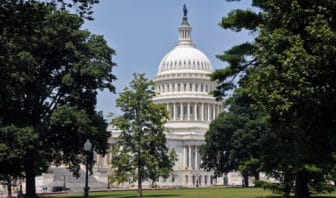Forty-five members of Congress have called for reforms to mortgage sales programs run by the Federal Housing Administration (FHA), Fannie Mae and Freddie Mac — including one program that was the subject of a Center for Public Integrity probe.

Heath Haussamen / NMPolitics.net
The U.S. Capitol Building in Washington, D.C.
The proposed changes are outlined in a March 1 letter to both Julian Castro, secretary of the Department of Housing and Urban Development (HUD), which oversees the FHA, and Mel Watt, director of the Federal Housing Finance Agency (FHFA). Watt’s agency regulates the government sponsored entities Fannie Mae and Freddie Mac.
The letter acknowledges prior reforms to the mortgage sales programs, such as the launch of sales to community-based nonprofit groups, rather than just commercial investors, as a “step in the right direction.”
“However,” the letter continues, “sale after sale seems to indicate…that the fundamental approach of these programs, to bundle up hundreds or thousands of properties at a time for sale to the highest available bidder, and without sufficient attention to potential outcomes for homeowners, communities, and the affordable housing missions of your agencies, has not changed.”
The letter was first circulated by Rep. Michael Capuano, D-Mass., who sits on the House Committee on Financial Services, including subcommittees on financial institutions and consumer credit and housing and insurance. Among the other signatories are fellow House financial services committee members Gregory Meeks, D-N.Y. and David Scott, D-Ga.
The Center for Public Integrity’s 2015 story about the FHA bulk sales program found that more than 98,000 mortgages have been sold through the so-called Distressed Asset Stabilization Program (DASP) since 2010, and that only a small fraction of those successfully avoided foreclosure. FHA began selling mortgages in bulk, often more than 900 loans at a time, in the wake of the 2008 financial crisis as a way to move troubled mortgages off its books.
Critics have argued that many of the mortgages are going to wealthy investors, who have not provided the original borrowers a second chance at avoiding foreclosure, which was also supposed to be a goal of the initiative.
The letter recommends four “key improvements” that would allow FHA and Fannie Mae and Freddie Mac to continue selling mortgages to improve their financial footing, while also encouraging neighborhood stabilization and preserving homeownership.
The signees ask the housing agencies to disqualify “bad actors” from participating in auctions, improve transparency of the sales and require buyers to commit to foreclosure prevention, rehabilitation and affordable housing efforts as part of these transactions.
HUD declined to comment on the letter, but said it would respond directly to the members of Congress who had signed it.
Capuano told the Center for Public Integrity that changes to mortgage sales programs should involve more nonprofit and community development organizations in the sales. The Center reported in 2015 that only 2 percent of DASP mortgages were sold to nonprofits.
“It’s very simple,” Capuano said, “it comes down to whether you think local communities are best served by nonprofit or a for-profit entity.”
While institutional investors are attracted to the sales because of the chance to obtain discounted mortgages and turn a profit, “public entities like Fannie and Freddie have an obligation that’s a little bit higher than that,” Capuano said..
Laurie Goodman, director of the Housing Finance Policy Center at the Urban Institute, said bulk mortgage sales are working as planned. “There’s no question that it’s a good program,” Goodman says of the HUD program in particular. “Yes, there are ways to improve the program; most of these recommendations (in the letter) involve transparency. For example, you don’t know what kind of modifications are being done in these programs. That’s one of our suggestions.”
U.S. Sen. Sherrod Brown, D-Ohio, and Democratic Rep. Elijah Cummings of Maryland have also asked HUD to address concerns about bulk mortgage sales.
